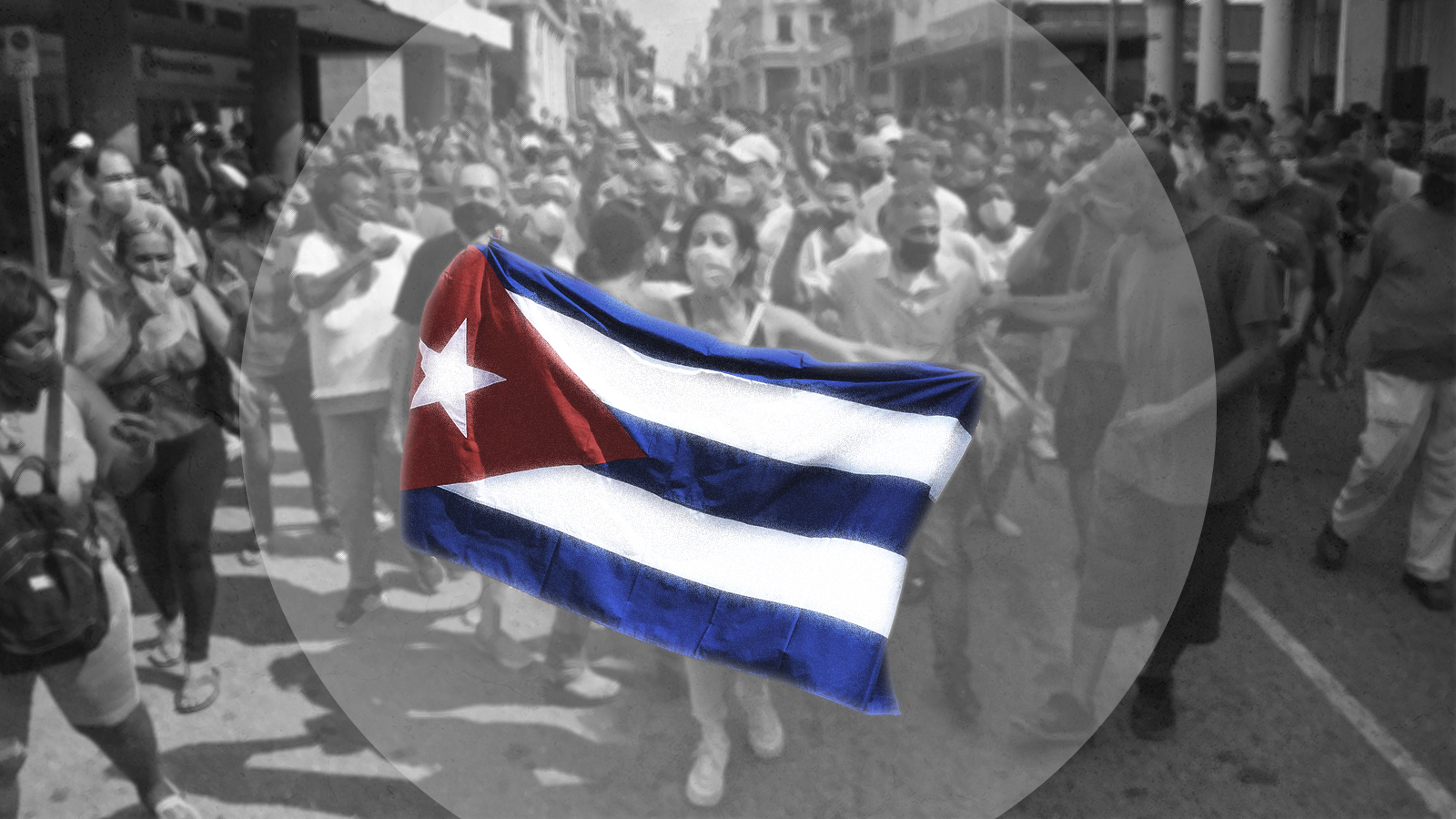Cubans reach their tipping point


Are Cubans protesting against a repressive Communist government? Or are they angry about bad governance that makes their everyday lives worse? Why not both?
The streets of Cuban cities on Sunday were filled with anti-government protesters, many of them bearing American flags and shouting out cries for freedom — the biggest demonstrations against the Communist regime since at least 1994. Media reports have depicted the movement as a response to pandemic-era deprivations, such as a shortage of food and vaccines, the result of a collapse in tourism dollars that has hurt an already-poor nation. A Biden administration spokesperson characterized the protests as reflecting "concern about rising COVID cases/deaths & medicine shortages."
That, naturally, drew a rebuke from American conservatives.
The Week
Escape your echo chamber. Get the facts behind the news, plus analysis from multiple perspectives.

Sign up for The Week's Free Newsletters
From our morning news briefing to a weekly Good News Newsletter, get the best of The Week delivered directly to your inbox.
From our morning news briefing to a weekly Good News Newsletter, get the best of The Week delivered directly to your inbox.
"People in #Cuba are protesting 62 years of socialism, lies, tyranny & misery," tweeted Sen. Marco Rubio (R-Fla.), "not 'expressing concern about rising COVID cases/deaths.'"
But it's not an either/or situation. If it's true that Cubans are protesting six decades of Communist government, it's also the case that they have endured that situation for six decades. So there had to have been a tipping point to prompt the new uprising. As our own Declaration of Independence says, people will suffer bad governments "while evils are sufferable." It's when those evils become insufferable that the citizens rouse themselves in protest.
And life in Cuba has become insufferable since the start of the pandemic, as it has in many parts of the world. Governments that handled the pandemic well — like in New Zealand — have remained popular. Governments that did a poor job, meanwhile, have often faced a loss of support. Cuba's government, which has survived for decades by casting the United States as the source of its problems, falls in the latter category. Since last October, the U.S. Coast Guard has intercepted more than 500 Cubans trying to flee the country by sea, compared to just 49 the year before.
"We can't take it anymore," a man named Alejandro told the BBC. "There is no food, there is no medicine, there is no freedom. They do not let us live. We are already tired."
A free daily email with the biggest news stories of the day – and the best features from TheWeek.com
People want freedom — but mostly they'll revolt when bad governance threatens their health and lives. Either way, it's clear Cuba's Communist government is in trouble.
Joel Mathis is a writer with 30 years of newspaper and online journalism experience. His work also regularly appears in National Geographic and The Kansas City Star. His awards include best online commentary at the Online News Association and (twice) at the City and Regional Magazine Association.
-
 Gabbard faces questions on vote raid, secret complaint
Gabbard faces questions on vote raid, secret complaintSpeed Read This comes as Trump has pushed Republicans to ‘take over’ voting
-
 Which way will Trump go on Iran?
Which way will Trump go on Iran?Today’s Big Question Diplomatic talks set to be held in Turkey on Friday, but failure to reach an agreement could have ‘terrible’ global ramifications
-
 High Court action over Cape Verde tourist deaths
High Court action over Cape Verde tourist deathsThe Explainer Holidaymakers sue TUI after gastric illness outbreaks linked to six British deaths
-
 Did Alex Pretti’s killing open a GOP rift on guns?
Did Alex Pretti’s killing open a GOP rift on guns?Talking Points Second Amendment groups push back on the White House narrative
-
 Washington grapples with ICE’s growing footprint — and future
Washington grapples with ICE’s growing footprint — and futureTALKING POINTS The deadly provocations of federal officers in Minnesota have put ICE back in the national spotlight
-
 Trump’s Greenland ambitions push NATO to the edge
Trump’s Greenland ambitions push NATO to the edgeTalking Points The military alliance is facing its worst-ever crisis
-
 Why is Trump threatening defense firms?
Why is Trump threatening defense firms?Talking Points CEO pay and stock buybacks will be restricted
-
 The billionaires’ wealth tax: a catastrophe for California?
The billionaires’ wealth tax: a catastrophe for California?Talking Point Peter Thiel and Larry Page preparing to change state residency
-
 Trump considers giving Ukraine a security guarantee
Trump considers giving Ukraine a security guaranteeTalking Points Zelenskyy says it is a requirement for peace. Will Putin go along?
-
 Bari Weiss’ ‘60 Minutes’ scandal is about more than one report
Bari Weiss’ ‘60 Minutes’ scandal is about more than one reportIN THE SPOTLIGHT By blocking an approved segment on a controversial prison holding US deportees in El Salvador, the editor-in-chief of CBS News has become the main story
-
 Will California tax its billionaires?
Will California tax its billionaires?Talking Points A proposed one-time levy would shore up education and Medicaid
